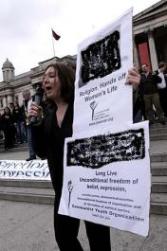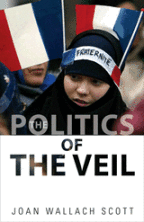 MONTREAL — No public servant – including Muslim teachers and judges – should be allowed to wear anything at work that shows what religion they belong to, leaders of Quebec’s two biggest trade union federations and a civil-servants’ union told the Bouchard-Taylor commission Monday.
MONTREAL — No public servant – including Muslim teachers and judges – should be allowed to wear anything at work that shows what religion they belong to, leaders of Quebec’s two biggest trade union federations and a civil-servants’ union told the Bouchard-Taylor commission Monday.
“We think that teachers shouldn’t wear any religious symbols – same thing for a judge in court, or a minister in the National Assembly, or a policeman – certainly not,” said Rene Roy, secretary-general of the 500,000-member Quebec Federation of Labour. “The wearing of any religious symbol should be forbidden in the workplace of the civil service … in order to ensure the secular character of the state,” said Lucie Grandmont, vice-president of the 40,000-member Quebec union of public employees.
Dress codes that ban religious expression should be part of a new “charter of secularism” that the Quebec government should adopt, said Claudette Carbonneau [pictured], president of the Confederation of National Trade Unions. Such a charter is needed “to avoid anarchy,” Carbonneau said Monday, presenting a brief on behalf of the federation’s 300,000 members at the commission’s hearing on the integration of immigrants in Montreal. That’s the same point of view as the 150,000-member Centrale des syndicats du Quebec, which includes 100,000 who work in the school system, the commission heard.
The unions’ anti-religious attitude – especially the idea to ban hijabs on teachers – got a cold reception from groups as disparate as a Muslim women’s aid organization and the nationalist St.-Jean-Baptiste Society of Montreal. “What that would do is close the door to Muslim women who want to teach,” said Samaa Elibyari, a Montreal community radio host who spoke for the Canadian Council of Muslim Women. “It goes against religious freedoms that are guaranteed in the (Quebec) Charter of Rights.”
Elibyari said Muslim women routinely face discrimination in the workplace. They don’t need unions on their back, too, she said. “When a young teacher calls a school to see if she can do an internship, and is asked on the phone straight out: ‘Do you wear the veil?’; when a cashier at a supermarket is fired and her boss tells her ‘The customers don’t want to see that,’ referring to the veil; when a secretary gets passed over for promotion even if she succeeds in all her French exams, and is told ‘take off that tablecloth’ – is that not discrimination?” Elibyari asked.
Canada.com, 10 December 2007

 Maryam Namazie of the Worker-Communist Party of Iran offers her thoughts (we use the word in its loosest possible sense) on the death sentence imposed on Parwiz Kambakhsh in Afghanistan. She writes:
Maryam Namazie of the Worker-Communist Party of Iran offers her thoughts (we use the word in its loosest possible sense) on the death sentence imposed on Parwiz Kambakhsh in Afghanistan. She writes: A small metal cross in Oxford’s Broad Street marks the spot where one of the worst acts of religious bigotry in English history was perpetrated: the burning of bishops Latimer and Ridley – the Oxford Martyrs – during the reign of Mary I, Bloody Mary, the last Catholic ruler of England.
A small metal cross in Oxford’s Broad Street marks the spot where one of the worst acts of religious bigotry in English history was perpetrated: the burning of bishops Latimer and Ridley – the Oxford Martyrs – during the reign of Mary I, Bloody Mary, the last Catholic ruler of England. Public Lecture
Public Lecture MONTREAL — No public servant – including Muslim teachers and judges – should be allowed to wear anything at work that shows what religion they belong to, leaders of Quebec’s two biggest trade union federations and a civil-servants’ union told the Bouchard-Taylor commission Monday.
MONTREAL — No public servant – including Muslim teachers and judges – should be allowed to wear anything at work that shows what religion they belong to, leaders of Quebec’s two biggest trade union federations and a civil-servants’ union told the Bouchard-Taylor commission Monday.